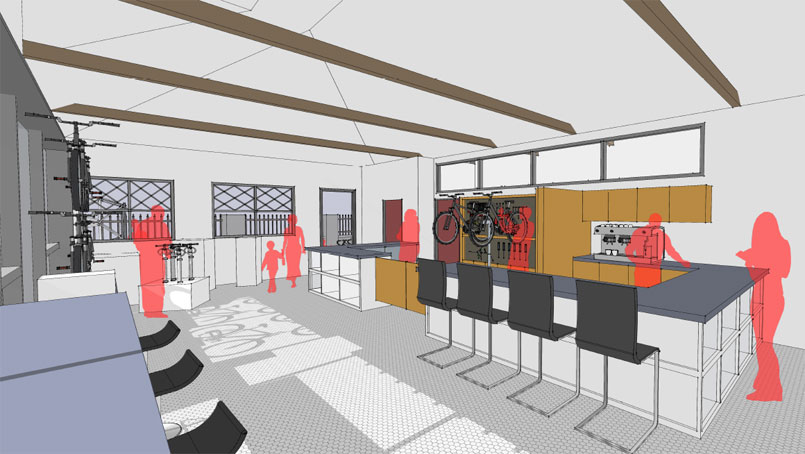
29 Jan HBI Forges Partnerships to Increase Capacity for Neighborhood Revitalization- Preservation Partnering – Part III
This is Part 3 and the last in a series of blogs in which HBI’s Jeffrey Morgan presents preservation partnering scenarios and the opportunities they present to steward historic and long vacant or blighted properties to new economic uses. Part 1 discussed the redevelopment of the Roslindale Substation in partnership with Roslindale Village Main Streets (RVMS)and HBI’s for-profit partner,Peregrine Group, LLC. Part 2 presented the planned redevelopment of the historic Fowler Clark Epstein farm in Mattapan in partnership with three other non-profits, Urban Farming Institute (UFI), The Trust for Public Land (TPL), and North Bennet Street School (NBSS).
Sip & Spoke Bike Kitchen, Upham’s Corner, Dorchester
The preservation of historic buildings is not only about the redevelopment and rehabilitation of the building structure. It also includes the need to find compatible uses and, within the historic tax credit structure, income generating businesses in a rental structure therefore tenants. In addition, given that many historic buildings in neighborhood business districts have small size retail spaces, the work of preservation often follows the path of small startups or what are often called “micro” businesses which are generally defined as single owner-operator enterprises that typically have less than 10 employees.
Finding the operators of these micro businesses for historic rehabilitation projects can be challenging and their business models are often risky which is why, in part, market driven real estate developers are often not interested in the smaller historic redevelopment projects. So a preservation partnership model that couples non-profit preservation real estate developers with micro-business entrepreneurs through the work of an organization that provides financial support for both the real estate developer and technical assistance for the business owner can leverage the capacity and skills of all partners to maximize the potential for greater success and effectiveness in neighborhood redevelopment and revitalization.
This model has been the structure for a recent project at HBI. In May of 2015, HBI received the tentative designation from the Department of Neighborhood Development (DND) to redevelop the Upham?s Corner Comfort Station in Dorchester. The 1912 Mission Style building is listed on the National Register of Historic Places along with the adjacent Dorchester North Burying Ground, which is also a Boston Landmark. HBI is partnering on this project with The American City Coalition (TACC), a nonprofit that provides pre-development support and technical assistance in the revitalization of urban neighborhoods, and Noah Hicks, founder of Dorchester’s Bowdoin Bike School, a non-profit that provides programmed opportunities for youth and adults to learn the skills needed to work as bicycle mechanics.
This unique preservation partnership will repurpose the building into the Sip & Spoke Bike Kitchen, a full-service for-profit combination bicycle shop and coffee shop that enhances the Upham’s Corner Main Street district by reactivating a long-abandoned building, creating a new commercial venture for a local entrepreneur, and expanding skills-based training and employment opportunities for neighborhood residents. It will continue the positive economic development in Upham’s Corner while reflecting the objectives of all three nonprofit organizations to strengthen the Upham’s Corner business district through their combined expertise in real estate development, historic preservation, and economic development.
This unique preservation partnership brings to bear the skills of HBI as a preservation real estate developer and historic property owner with TACC’s focus on bringing development partners together by supporting pre-development costs and providing technical assistance and business support services to entrepreneurs like Noah Hicks to rent the micro-business spaces.
This unique preservation partnership will both redevelop an important but at-risk historic building demonstrating that HBI’s model of preservation-based redevelopment can create economic opportunity for entrepreneurs like Noah Hicks; and highlight TACC’s model of facilitating a partnership between developer, tenant, and community so the renovation and use of the building will have a positive catalytic impact on the neighborhood.
You Can Support This Effort
Part of the work of this unique preservation partnership includes raising the money needed to fund the redevelopment both exterior building and interior business. HBI has secured commitments for the funds needed for the building’s structure and exterior. As the business owner and tenant, Noah Hicks, with the support of TACC, is embarking on a fundraising campaign for the business portion that includes community support for the project through The Sip & Spoke Bike Kitchen Indiegogo Campaign.
The Sip & Spoke Bike Kitchen will offer retail sales of new and refurbished bicycles and parts, new accessories, as well as maintenance and repair services to a heretofore underserved local biking community in a key transportation artery that is increasingly used by local and regional cyclists. The Sip & Spoke Bike Kitchen will serve high quality coffee and a range of food items sourced from local and respected vendors, providing the neighborhood?amenities?identified by local residents.
So you, too, can be a preservation partner. You can help make this a grass-roots community project. This is an asset and benefit to the experience of living in your neighborhood and community. Please support this unique preservation partnership in the delivery of the rehabilitation of the Upham?s Corner Comfort Station into an economically viable and sustainable local business enterprise.



